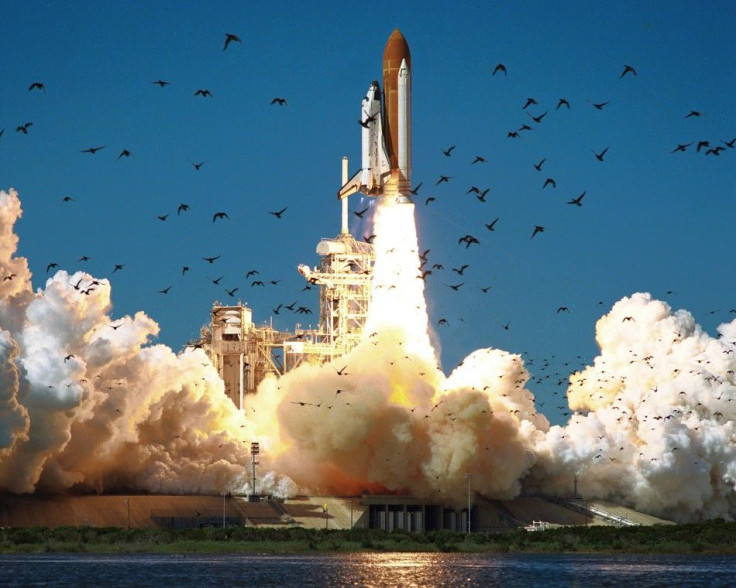Final Space Shuttle Launch Recalls Challenger Disaster for Children of the 80s

As the Atlantis took flight today, marking the end of the space shuttle program, many Americans couldn't help but recall the 1986 space shuttle Challenger disaster - particularly those who, as children, watched it live on television in school.
The Challenger launch - on Tuesday, January 28, 1986 - was at the center of a NASA campaign to promote visibility and support for its space programs. Christa McAuliffe, a New Hampshire schoolteacher, was selected among 11,000 applicants to participate in the mission via NASA's Teacher in Space Project. Across the country, classrooms watched the shuttle launch live on television - many had been preparing for weeks with space-themed projects and lectures.
The thrill gave way to bewilderment and horror when the spacecraft disintegrated 73 seconds into its flight, taking the lives of its seven crew members and forever changing the many thousands of young students who witnessed it live.
In the hours leading up to the Atlantis launch, members of Generation X took to Twitter to express their ambivalence and anxiety:
Mixed feelings about the #SpaceShuttle launch today. The first launch I clearly remember as a kid was Challenger. Yeah, *that* Challenger.
I hope all the pressure of launching today doesn't override safety concerns. Thinking of Challenger..
Didn't realize how affected I still am by the Challenger disaster. I'm really nervous for Atlantis!
Ever since I was a kid watching the Challenger, I get nervous everytime I see a launch.
Ron Currie, Jr., a critically acclaimed author who watched the Challenger disaster with his fifth-grade class in Maine, based the opening chapter of his 2009 novel Everything Matters! on his memory of the tragedy.
One of the things I continue to find sort of morbidly fascinating about the Challenger disaster is that only schoolchildren watched it live, as part of the Teachers in Space program. I'd guess a lot of people who were adults at the time might recall having seen it live, but the fact is that the major networks carried it on taped delay, cutting from their regular programming only after the shuttle had ripped to pieces over Cape Canaveral.
Indeed, the Challenger disaster marked a peculiar generational divide between children and their parents and teachers who struggled to comprehend the tragedy and the trauma it caused the young people who witnessed it. [It] was my first brutal acquaintance with the reality that life could be easily snuffed out at any moment, Currie said. That in fact my impression of that ubiquitous yet undefinable group known as adults being in control of everything couldn't have been further from the truth.
President Ronald Reagan was scheduled to deliver the State of the Union address on the evening of the tragedy, but instead delivered a national address on the Challenger. At one point, he attempted to console the children who witnessed the disaster:
And I want to say something to the schoolchildren of America who were watching the live coverage of the shuttle's takeoff. I know it is hard to understand, but sometimes painful things like this happen. It's all part of the process of exploration and discovery. It's all part of taking a chance and expanding man's horizons. The future doesn't belong to the fainthearted; it belongs to the brave. The Challenger crew was pulling us into the future, and we'll continue to follow them.
Many among those the President was speaking to 25 years ago were caught off guard by their emotional reactions to the successful launch of the Atlantis:
I cannot watch a shuttle launch without thinking of Challenger. And tearing up a little. Vivid memories and an amazing human accomplishment.
Sooo relieved to see #Atlantis reach orbit safely. Always hold my breath after Challenger. #NASA
In 1986, few months after Challenger, space shuttle wallpaper was put up in my bedroom. Never dreamed the shuttle program would end.
Somewhere, Christa McCauliffe and the other Challenger Astronauts are smiling.
Though the shuttle program has come to a close, space exploration will continue: NASA will launch The Mars Atmosphere and Volatile EvolutioN (MAVEN) in 2013, a mission devoted to the study of the Martian upper atmosphere, which will investigate the possibility that Mars was supportive of life before its atmospheric gases were burnt away by the sun.
Currie, for his part, believes that the desire to explore beyond the tangible is an unassailable part of human nature that will endure in any atmosphere.
I think history shows that no amount or scope of tragedy can keep us, as a species, from looking outward, just beyond the edge of our known world.
© Copyright IBTimes 2024. All rights reserved.






















